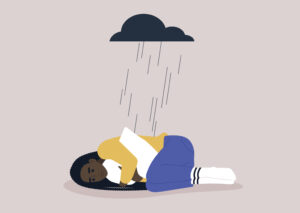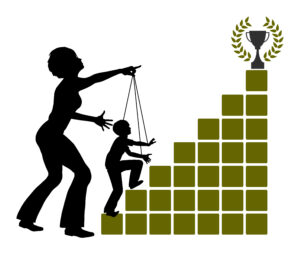Blog

The Trap of a Victim Mentality—And What to Do About It
Article Summary: What a victim mentality is, signs of it, where it comes from, its many costs, and what to do about it. +++ When we have a victim mentality, we believe that bad things we experience are the fault of others and will keep happening so there’s no point in changing. We may even feel that the world is against us. Essentially, we identify ourselves as a helpless victim of negative circumstances. It’s a form of self-sabotage and often comes with an addiction to drama. When we have a victim mentality, we have thoughts like the following: Why me?

The Trap of Being Unrealistic
Many of us have fallen into the trap of being unrealistic—of being overly optimistic and downplaying the difficulties we’re likely to encounter. This is not a new problem. In fact, it’s been documented across the ages. In the 5th century B.C., Thucydides, a Greek historian and Athenian general, wrote, “it is a habit of mankind to entrust to careless hope what they long for.” Julius Caesar, a Roman general and emperor in the 1st century B.C., added, “Men willingly believe what they wish to be true.” The idea of unrealistic optimism also famously goes back to German philosopher Gottfried Wilhelm

Gratitude and Recognition in the Workplace–The Benefits and Top Practices
We don’t need to look at the data on “quiet quitting” and the “great resignation” to understand that many workers today feel undervalued and underappreciated. They feel like disposable widgets in a heartless organization. Though recognition is a fundamental human need, many managers think that having a job and salary with benefits should be thanks enough for their workers. Those managers may not only be stressed but also unappreciated themselves. But they’re missing something fundamental. In a previous article, “The Trap of Not Being Grateful for What We Have,” we saw that gratitude can lead to better moods, more happiness,

The Trap of Not Being Grateful for What We Have
With the way our brains work, it’s easy to take things for granted and not be grateful for what we have. We may appreciate things for a while but then start discounting them. The result is that we can go through long periods of our lives without noticing and acknowledging the good things. When we fail to appreciate what we have, it can lead not only to less happiness but also potentially to self-absorption and a sense of entitlement. Meanwhile, we’re missing out on the incredible benefits of gratitude. What Is Gratitude, Exactly? Dr. Robert Emmons, Professor of Psychology

The Trap of Thinking It’s Too Late for Big Things in Our Lives
Are we living a good life? Have we been pursuing our dreams? If we were to die tomorrow, would we be happy with our life, knowing we’ve lived well? Or are we thinking it’s too late to live a good life and pursue the things we want in life—our goals, dreams, or adventures? These questions may be uncomfortable, but they’re essential in informing our quality of life and whether we experience a sense of fulfillment. The State of Our Dreams Most of us have goals and dreams. Common examples include having a family, traveling around the world, building a

Are You Sleepwalking through Your Life?
It may be hard to believe when our lives seem so frenetic at times, but many of us are sleepwalking through our lives—passively going through the motions of life while not feeling awake and alive. This kind of “life sleepwalking” is different, of course, from physical sleepwalking (also known as somnambulism), in which we get up and walk around while in a state of actual sleep. But both forms of sleepwalking are similar in the sense that we’re engaging in everyday activities but not really conscious of what we’re doing. “If we’re honest, sleepwalking describes many of our lives. You

The Trap of Self-Doubt—And How to Overcome It
We’ve all experienced self-doubt. We’ve felt uncertain about ourselves and our place in the world. Or we’ve questioned our capabilities and potential. Any time we make a major mistake, we risk losing confidence. We may stop trusting ourselves as we feel wounded. Self-doubt shows up as a voice in our head: What if I make a mistake? Or look like a fool? What will people think of me? At the root of self-doubt is fear—fear of failure or judgment. Sometimes we lose faith in ourselves. Signs of Self-Doubt in Action How to know if we struggle with self-doubt? When

Self-Deception: Why We Do It and How to Stop It
Article Summary: What self-deception is, including examples and signs of it, where it comes from, its high costs (as well as some benefits), how it degrades our leadership, and what to do about it. +++ We all do it. We engage in self-deception—hiding the truth from ourselves about our true feelings, motives, or circumstances. When we’re deceiving ourselves, we’re denying evidence, logic, or reality and rationalizing choices or behaviors to serve a false narrative. We’re not seeing or viewing things accurately. Our self-deception can be conscious or unconscious, controlled or automatic, acute or chronic. “You can fool yourself, you know.

The Trap of Living Someone Else’s Life
As if life weren’t hard enough sometimes, we all have to navigate the challenge of reconciling our own preferences for living with the influences and expectations of those around us. We have a powerful desire to be free and unencumbered but also a deep-seated desire to be connected and appreciated. When these desires conflict, we can end up living someone else’s life—chasing the goals and dreams of others instead of our own. Many people are deeply influenced by the expectations of their parents—or of teachers, coaches, mentors, or peers: Be a lawyer. Or consultant. Run the family business. Choose the

People-Pleasing: Why We Do It and How to Stop It
We all do it sometimes. We put others’ needs ahead of our own. It’s called people-pleasing: having an excessive focus on making others happy at the expense of our own wants and needs. It’s been called “the disease to please.” We use it to avoid risking the disapproval of others or the discomfort of standing up for what we want. It’s a form of self-neglect as we seek validation from others. People-pleasing is related to what social psychologists call “sociotropy,” the tendency to place an inordinate value on relationships over personal independence. It often comes with a strong need for

What Keeps Us from Moving On?
We can get set in our ways in our life and work, falling into the trap of not moving on from something when we should. It may be a job or career that’s no longer a good fit. Or a relationship that’s not working anymore. It could be a chapter in our life that needs to make way for a new one. Or a social group that we’ve outgrown. It’s common to fall into the trap of not moving on—of holding on too long to a bad or suboptimal situation, relationship, job, or path and not advancing forward. What

What to Do About Overthinking, Rumination, and Worrying
One of the common traps of living affecting so many of us these days is overthinking—excessively analyzing something or dwelling on possibilities and second-guessing ourselves. We think about some things—mostly bad things—too much and for too long. It can be mentally replaying awkward conversations or embarrassing moments repeatedly. That time we got dumped by our childhood crush. Or worrying about an upcoming presentation or interview. Putting off asking for a promotion or raise because we’re overthinking. Our thoughts spiral out of control when our boss mentions out of the blue that we need to talk. I’ve fallen into this trap

Are We Numbing Our Lives Away?
One of the most insidious traps that we can fall into these days is numbing—escaping from our thoughts and feelings by doing other things. When we do this, we’re taking the edge off feelings that cause us pain or discomfort. We’re anesthetizing difficult emotions. The problem is compounded by the fact that many families and cultures teach people, either explicitly or implicitly, to suppress their feelings. We can numb not only with things like alcohol, drugs, or smoking but also with binge-watching shows or doom-scrolling social media. Our numbing might be excessive work and busyness or constant emailing and texting.

Are You Focusing Too Much on Others’ Needs?
Our daily demands can be intense. We may have pressures and obligations at work. Household chores. Bills, taxes, mortgage payments. On top of that, we want to help others: our spouse and children, our colleagues on a tough project, our friends and neighbors. Sometimes it can feel overwhelming—especially if we fall into the trap of focusing too much on others’ needs, draining our own reserves. Such excessive other-focus can get us into real trouble. It’s a common challenge among people who work in the caring professions, including doctors, nurses, teachers, counselors, social workers, and veterinarians. Anyone who frequently cares for

The Hidden Trap Catching Many High-Achievers
We all have wants and needs, but most of us don’t think of ourselves as needy. That may be true, but in many cases we’re more needy than we think. For many people these days, and especially high-achievers, neediness shows up as excessive attachment to recognition, praise, or success–or to saving others–for self-acceptance. It comes with an excessive desire for reassurance or affirmation from others. This is easy to miss because we’re probably reluctant to admit it when we feel it. Such achievement-based approval is baked into Western culture and our society’s views about what’s expected in life—and what comprises

